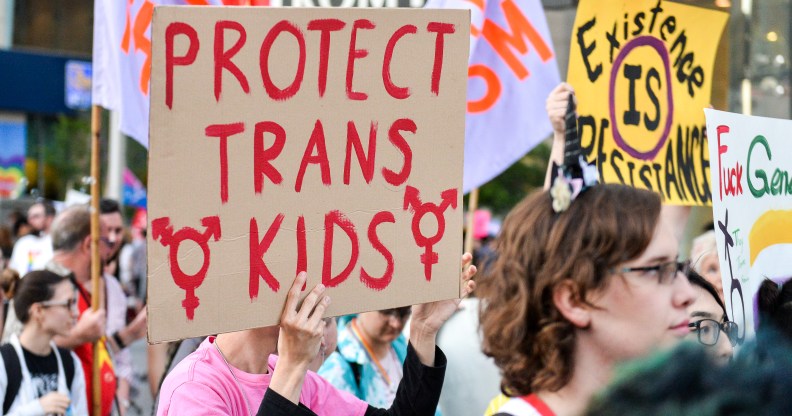Puberty blockers can literally save the lives of transgender teens, new study confirms

(Anatoliy Cherkasov/SOPA Images/LightRocket via Getty)
Puberty blockers can be “life-saving” drugs for trans teenagers, according to a landmark study that is the first to examine access to puberty blockers and suicide risk.
The study, published in medical journal Pediatrics, found that if trans teenagers have access to the medication their chance of suicide and mental health problems significantly declines.
Access to puberty blockers for a trans teen who wants them reduces their likelihood of trying to die by suicide in both the short and long term, the study found, as well as significantly reducing their likelihood of experiencing mental-health problems.
Multiple medical associations, including the Endocrine Society, have guidelines recommending doctors offer trans teens pubertal suppression therapy, also known as puberty blockers, which has been a treatment option in the US since 1998.
Puberty blockers delay puberty until a trans teenager is old enough to make decisions about having gender-affirming medical treatment.
“Historically we have known the puberty blockers are safe and effective and this is totally reversible, so the benefits far outweigh any risk. It is sort of a no-brainer to make these available in these circumstances,” said Dr Michelle Forcier, an associate professor of paediatrics at Warren Alpert Medical School of Brown University, who was not part of the study.
The research comes as a dozen states in the US are promoting bills that focus on young trans people at the urging of conservative advocacy groups.
These bills include barring doctors from providing certain gender-related medical treatment to young trans people, including puberty blockers, and banning young trans people from playing school sports.
Forcier added that nobody would deny a child with asthma their inhaler, or refuse cancer treatment for a child with cancer, yet some parents still express reservations about puberty blockers.
She wants to remind these parents that pausing puberty is a “life-saving option”, she said.
“By not allowing their child to use these drugs, that is not a neutral option,” said Forcier. “This is why this paper is so important. This access is associative into adulthood and is important for safety. We know that access can offer protective effects. This is something that will help a parent keep their child safe.”
Dr Rachel Levine, a practising paediatrician in Pennsylvania, said this new study is important because it’s the first to specifically show the link between access to puberty blockers and a decrease in suicidality.
“It is very important for medical professionals to understand scientific studies like this,” Levine said.
“It is also critically important as far as policy,” she said, “that policy makers do not get in the way of medical standards of care.”

